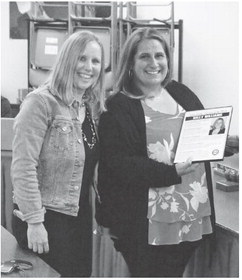Medford board mulls reapplying for federal dome grant


After-the-fact change in federal rules eliminated Medford from being in competition in last grant cycle
A rule change resulted in Medford’s FEMA grant not even being considered by the federal agency reviewers.
Grant writer Jordan Buss who prepared the application, told members of the Medford Area Public School Board at their meeting Monday night, that a federal agency changed the rules after the grants were submitted resulting in no Wisconsin school district being considered at the national level.
According to Buss, FEMA requires hazard mitigation plans in place for anyplace that applies for a grant. Taylor County has a hazard mitigation plan, which has been adopted by the city of Medford. However it has never formally been adopted by the School Board, although the school is in the city and county and falls under the plan. Buss said that in past grant cycles it was enough that the schools were covered by the municipal plan. He said that after the grant application, FEMA changed its interpretation and is now putting out guidance that the school district must either adopt the hazard plan or that the grants must be submitted through the municipality.
“They essentially pulled the rug out from underneath us,” Buss said.
Board president Dave Fleegel noted it would not take much for the board to formally adopt the county and city’s existing hazard mitigation plan since they already fall under it.
The school district was seeking grant funding to cover approximately $4 million out of estimated $6 million 13,000 square foot severe weather-rated structure which would serve as an emergency storm shelter for the surrounding area in time of need. The benefit to the district is that when not used as a shelter, the space could be used for any school needs provided it could be cleared within five minutes.
The school district had eyed the potential space for possible use as additional gym space, especially with gym space being carved from the last referendum attempt.
The question facing board members on Monday night was if they want to reapply for the funds and if so, would they want to make revisions about what the space would be used for to reflect changes in priorities. Buss said he would not charge the district to resubmit the application or for if there were minor changes to be made. What the structure would be used for when not used as an emergency shelter can be modified even after a grant is awarded. Buss said it is a matter of going through the process.
To be considered in the next grant cycle, the district would have to apply by January 2023. While the grant awards are supposed to be announced in June, this year it was the end of July before the grants were announced.
Board member Kurt Werner asked why they would consider reapplying with the same application. “A lot of people in the community view this as a want,” Werner said, noting that the major needs in the district are for more science and technology education classrooms.
District administrator Pat Sullivan said others would also say gym space is a need. It was noted that some groups such as the MMA made pledges of support based on it being gym space as a way to promote mental and physical health. He noted the MMA had pledged $500,000 of the $2 million local match for the project.
Fleegel noted that even if the district got the funds they would have three years to decide how it was to be spent. He gave Abbotsford as an example of a district that changed their focus on how to use the space based on evolving needs.
The first step in moving forward was for the district to direct Buss to inform the state emergency management of the district’s intent to file an application. This has to be done by the end of September.
“I don’t think it is a problem to move forward with the intent,” said board member Jodi Nuernberger.
“There is no downside to moving forward,” said board member Don Everhard.
Fleegel said the discussion about how the space could be used could be done at a future meeting but that they needed to decide if they wanted to file the intent to reapply.
Board members voted to move forward with filing an intent to reapply. Fleegel emphasized that this does not obligate the district to apply. He also noted that even if the district was awarded the grant for the structure they would have three years to get it built and at numerous points could stop it.
Fleegel said he was in favor of the application and at a minimum creating some additional tech ed classrooms in the space.
Board member Brian Hallgren compared it to when the Medford Area Middle School was built in the 1990s when the state covered 64% of the cost of the construction. “We should have been building the hell out at that time,” he said, noting that at 2/3 of the cost being covered by a federal grant, the district should jump at the opportunity to address space needs.
“We have to take these opportunities,” he said, noting they will not be around forever.
Board member Don Everhard also supported moving forward with reapplying for the grant. “I don’t know how you can hope for a better deal than that,” he said of the grant covered two-thirds the cost.
“You would never get that space for that price,” he said.
Board members will discuss reapplying or modifying the grant request at the September board meeting.
COVID-19 protocols
Students who are sick and test positive for COVID-19 either through an at-home or lab test are being asked to stay home for at least five days and it is recommended, but not required, that they wear a mask when back to school on days six through 10.
Sullivan said that was the protocol the district planned to follow for the start of the school year. There would be no contact tracing by the district and no alerts to staff or parents given if a student was out with COVID. He compared it to being at the grocery store where people might or might not be sick.
“What you are saying is exactly right,” Everhard said. “If you feel sick, check yourself out.”
“It is a good place to start,” Fleegel said of the protocol.
In other business, board members:
Reviewed building staffing levels. At Medford Area Elementary School the district reduced the number of sections of first grade to four resulting in section sizes of 22-23 students each. Assistant principal Shelly Crank-Woller noted this puts the district right on the edge for class size but felt it was less disruptive than rearranging sections at the last minute. “We feel we are in an OK place at this point,” she said.
Received an update on district health insurance. At the September meeting representatives from Aspirus and Security Health will present their best offers for the district with the board to decide which to choose. Everhard cautioned about being careful for the district to not be manipulated into going with one over the other because one may pump a lot of support into school programs. The district spent about $5.7 million in health insurance premiums last year.
Approved staying with Tricor Insurance for the district’s general liability, property, workers compensation, crime and cyber insurances at a cost of $195,264. This is down from last year by about $3,000. According to business services director Audra Brooks, the district is benefitting from having a .67 modifier on its workers compensation insurance thanks to having low workers compensation claims.
Approved on second reading updates to policies regarding Rural Virtual Academy scholarships including the academic excellence and technical excellence scholarships. There were few changes from previous policies. In other policy action, board members approved a clarification to the student harassment/bullying complaint procedures.


